26 Ways Allies Can Support
Intersex Awareness Day on 10/26
| Compiled by interACT: Advocates for Intersex Youth and Intersex Justice Project | |||
 Hans HansLindahl |
 Bria Brown-King |
 Sean Saifa Wall |
 Pidgeon Pagonis |
Many of us know about the harms of LGBTQ+ youth “conversion therapy.” But did you know about the physical, surgical harms faced by intersex youth?
Some doctors still believe it is okay to permanently change the genitalia and other sex traits of intersex minors by recommending unnecessary surgeries to parents. This is connected to a historical belief that changing intersex bodies will stop kids from growing up gay or transgender.
Intersex Awareness Day is October 26th. With these smart, actionable steps, allies can prepare all month long! Whether you have 5 minutes or 5 days, $500 or $0, there’s an option for everyone. Read on to learn how allies can support intersex people. How many things on this list can you do this month? Click on each item to expand and learn more.
 Check out interACT’s ally do’s and don’ts document! It’s a great place to start your #IntersexAwarenessDay journey. Here’s a few tips from the document to start with:
Check out interACT’s ally do’s and don’ts document! It’s a great place to start your #IntersexAwarenessDay journey. Here’s a few tips from the document to start with:
- Have a discussion about that ‘hermaphrodite,’ ‘bearded lady,’ or ‘micropenis’ joke. These terms aren’t funny, they’ve been used to shame real people.
- Honor intersex friends who trust you with personal or medical information. We’re trying to get to a place where coming out conversations don’t involve expectations of sharing medical trauma and anatomical details. Let people share what they need to from their own story, without more personal questions you wouldn’t ask a non-intersex person.
What did you learn about human anatomy in your own middle school sex ed class? Take a few minutes to think back, and a few more to upgrade your vocabulary.
It’s very common for people to use the word “female” to refer to one package of bodily traits, and “male” to refer to another. Many sex education classes use these words to talk about body parts. For example, “female genitals,” is usually a reference to having a vagina, or “male chromosomes,” is usually a reference to having XY chromosomes. But intersex people often have anatomy that does not line up in either of those two exact ways. Gender and anatomy are not the same. So how do we talk about body parts in an inclusive way?
In general it is best to begin by describing body parts in plain, non-gendered terms, e.g. “has a vulva and vagina” instead of “has female genitals.” If you are speaking about or to a specific person, always ask what terms they prefer. Take their lead.
Body parts are non-gendered, unless they belong to a specific person—then, body parts are the gender of the person they belong to. Here’s an example: imagine an intersex woman who describes her own gender as female, and has XY chromosomes, a vulva and vagina, and internal testes. Her XY chromosomes are not “male chromosomes.” She is a woman, and therefore for her, “female chromosomes” means XY chromosomes. Likewise, an intersex person who has a non-binary gender and XX chromosomes does not have “female chromosomes,” but just two X chromosomes, or non-binary chromosomes.
For more tips, see our intersex-inclusive language guide PDF.
 We need media work, we need law and policy work, and we need advocates to organize directly in their communities. Change takes many ways. If you have more time and resources, consider organizing an Intersex Awareness Day event or action.
We need media work, we need law and policy work, and we need advocates to organize directly in their communities. Change takes many ways. If you have more time and resources, consider organizing an Intersex Awareness Day event or action.
The Intersex Justice Project offers a toolkit for hosting an #EndIntersexSurgery protest in your community.
If another event is more your style, consider hosting a fundraising event, such as a 5k race or mixer, with proceeds going to an intersex organization. See what Stanford University’s Medical Student Pride Alliance did as an example!
Intersex Awareness Day has always been a protest. October 26th marks the anniversary of the first public demonstration by intersex people in the United States. In 1996, a small group gathered in Boston to protest at the American Academy of Pediatrics’ annual conference. Together with the support of transgender allies, the group protested the surgical “correction” of intersex infants’ genital differences. Intersex adults demanded the right to make their own choices about their own bodies. Their fight continues to this day.
Check out more information: learn about Intersex Awareness Day from its co-creator, Mayor Betsy Driver, and from an intersex activist who attended the 1996 protest, Morgan Holmes. Also see the 2018 article How to Support Intersex People on Intersex Awareness Day. If you learned something, go ahead and share on social media using the hashtag #IntersexAwarenessDay.
(Content warning: descriptions of surgeries)
In order to fight for intersex rights, we need to understand what intersex surgery means. Intersex people have a right to make decisions about their own bodies and sexual futures, just like anyone else. Even though every human rights organization to have considered the issues agrees, intersex children are still widely denied that equal right.
Intersex surgeries have nothing to do with medical need. Doctors often pressure parents into choosing intersex surgeries, which are surgeries done to conform genitals or other sex traits to ideas about what a “male body” or “female body” are supposed to be like. They include, but are not limited to:
- Moving an already working urethra simply so a child can pee standing up, because that is “what normal boys are supposed to be able to do”
- “Repositioning” or “reducing” a large clitoris for aesthetic reasons
- Creating or deepening a vagina, because “girls are supposed to be able to receive their future husband”
- Removing gonads (ovaries, testes, or ovotestes) that do not “match up” with the external genitals, but would have been a person’s natural source of hormones
In addition to carrying high risks for future sexual function, intersex surgeries are almost never necessary before puberty. Intersex adults have rallied around protest slogans like, “fix your hearts, not our parts,” for decades.
Social change comes slowly. While many in the medical community have listened to the suffering of intersex adults, some continue to ignore patients’ voices. Pediatric urologists, who perform—and thus profit from—intersex surgeries, lead political opposition to bills that would give intersex adults control over their bodies. The Societies for Pediatric Urology (SPU) continues to lead in lobbying against intersex-affirming legislation, including in interACT’s former bill in California, arguing that surgeries on minors’ sex traits are for parents and specialists to choose—instead of the individual who will live with any future consequences.
Sometimes a small act of kindness can go a long way. Buying an intersex friend a surprise cup of coffee, dropping some coin in their bank account, or donating on their behalf to an intersex organization could be a great way to start. If you are blessed enough to have an intersex person in your life, let them know you appreciate them.
Being intersex can also be expensive! Intersex people often have to pay out of pocket for medical costs because of things that were done to them in childhood. Intersex Awareness Day is a great excuse to chip in a few dollars to an intersex person’s HRT (hormone replacement therapy) fund or medical crowdfunding campaign.
 “Did you know that the ‘I’ in LGBTQIA stands for intersex?” A good starting point for conversations is interACT’s Buzzfeed video, “What it’s Like To Be Intersex.”
“Did you know that the ‘I’ in LGBTQIA stands for intersex?” A good starting point for conversations is interACT’s Buzzfeed video, “What it’s Like To Be Intersex.”
Always start from a place of curiosity and non-judgement! If friends haven’t heard of the “I,” that’s okay. Each one teaching one is what it’s all about. Watch the Buzzfeed video together, or if you have more time, a longer intersex documentary such as Every Body streaming on Peacock or Prime, or the freely available Intersexion.
It’s still a very ear ly time for intersex representation. There are only about 25 known books written by intersex people themselves. Read one! Here is a list of all the intersex books written by intersex people.
ly time for intersex representation. There are only about 25 known books written by intersex people themselves. Read one! Here is a list of all the intersex books written by intersex people.
For memoirs, try the newly published Nobody Needs to Know by intersex activist Pidgeon Pagonis, Inverse Cowgirl by political advocate Alicia Roth Weigel, Not Uncommon Just Unheard Of by educator Esther Morris Leidolf, or XOXY, by interACT Executive Director Kimberly Zieselman. We highlight all four in this blog post to give you a taste. Ready for more? There’s Born Both, or Intersex (For Lack of a Better Word). We also recommend the book Raising Rosie, a memoir by parents of an intersex child.
Once you’ve read the book, pass it along to a friend! This could also be a great opportunity to get free intersex resources to your local community. See if your local or school library has a section for LGBTQIA+ books and films. If so, does that section include any books or films by intersex people?
Often libraries take requests for book and film orders, and might even be happy to hear from engaged patrons!
To date, not one U.S. hospital has issued clear policy for delaying intersex surgeries for individual consent. This means that no U.S. hospital is in line with the recommendations of most international human rights organizations. Lurie Children’s of Chicago made history by being the first hospital to ban intersex surgery, but the exceptions in the policy are still a threat to the bodily autonomy of children.
Intersex work is drastically underfunded. Only a very small number of intersex organizations are able to support full time staff to move quickly in their work. Your donation helps intersex-led organizations continue to advocate for intersex rights.
interACT is the only intersex-led policy organization in the United States specifically dedicated to fighting for the rights of intersex youth. Donate to interACT here.
The Intersex Justice Project (IJP) is a grassroots organization that empowers intersex people of color to advance change and #EndIntersexSurgery. Donate to IJP here.
For small intersex organizations, every amount helps! For example, $20 could represent a share of a plane ticket. $10 could mean shipping brochures by intersex youth to a partner organization. $5 could buy a coffee for a youth advocate giving a talk at a legislative event. Give what you can, and if money is tight, there are many other ways to show support!
 When it comes to surgeries to change the appearance of intersex genitalia, #DelayIsOkay! It must be up to the adult intersex person. Several states have proposed bills to affirm intersex individuals’ rights to make decisions about their own bodies.
When it comes to surgeries to change the appearance of intersex genitalia, #DelayIsOkay! It must be up to the adult intersex person. Several states have proposed bills to affirm intersex individuals’ rights to make decisions about their own bodies.
Make sure you are signed up to get advocacy emails specific to efforts in your state! (Signup at the top of the page.) Affirming intersex rights starts at the state level.
There are medical clinics that serve the LGBTQIA+ community. Yet often, these clinics have little to no intersex experience. Intersex medical needs are distinct from LGB and trans medical needs. Still, these smaller community clinics can feel like safer places to some intersex people seeking care. It’s important for intersex individuals to have access to information about local clinics. Here’s a database of LGBTQ medical clinics by state.
LGBT people know what it’s like to have to educate their healthcare providers. Intersex people usually have to do this from the ground up, too. Luckily, resources exist for doctors to educate themselves. Ask your clinic if they’ll offer print outs and resources like interACT’s Hospital Policy Guide, What We Wish Our Doctors Knew brochure, intersex language sensitivity guide, and medical ally tips sheet. Or bring a few by yourself!
There are intersex YouTubers who have created videos about their experiences, such as Pidgeon, Hans, Emily Quinn, and Babalwa Mtshawu. There is lots of quality, free stand-alone content available, such as:
The Intersex Justice Project has a series of intersex poster art! Download their toolkit with printable posters by queer ally artists, as well as a tutorial to print and hang large posters using wheat paste. Hang one in your home, school, or outdoors.
 Intersex Awareness is also postering for IAD 2023! Sign up to hang posters in your area. (Too late for shipment? Print some at home, and make a donation!)
Intersex Awareness is also postering for IAD 2023! Sign up to hang posters in your area. (Too late for shipment? Print some at home, and make a donation!)
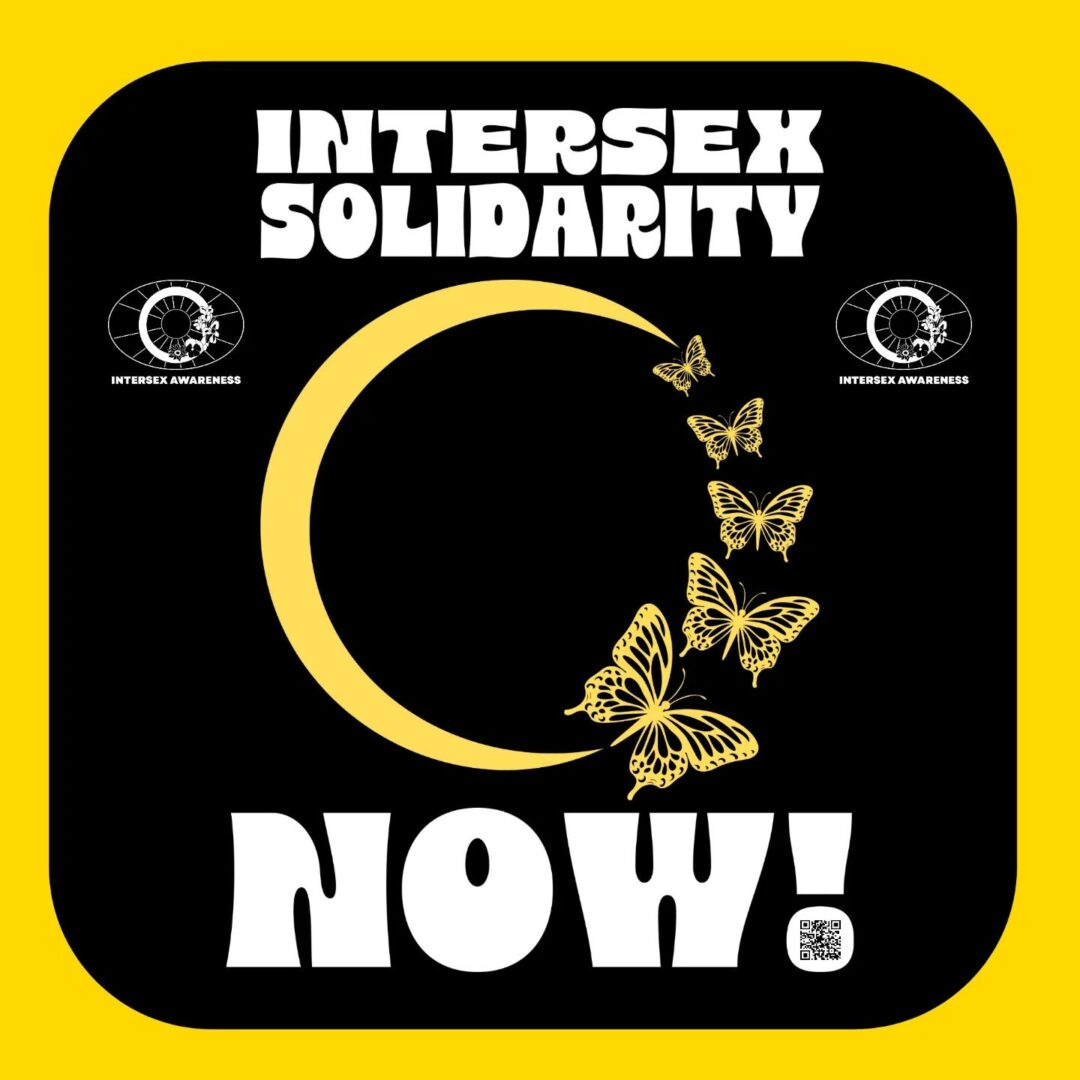
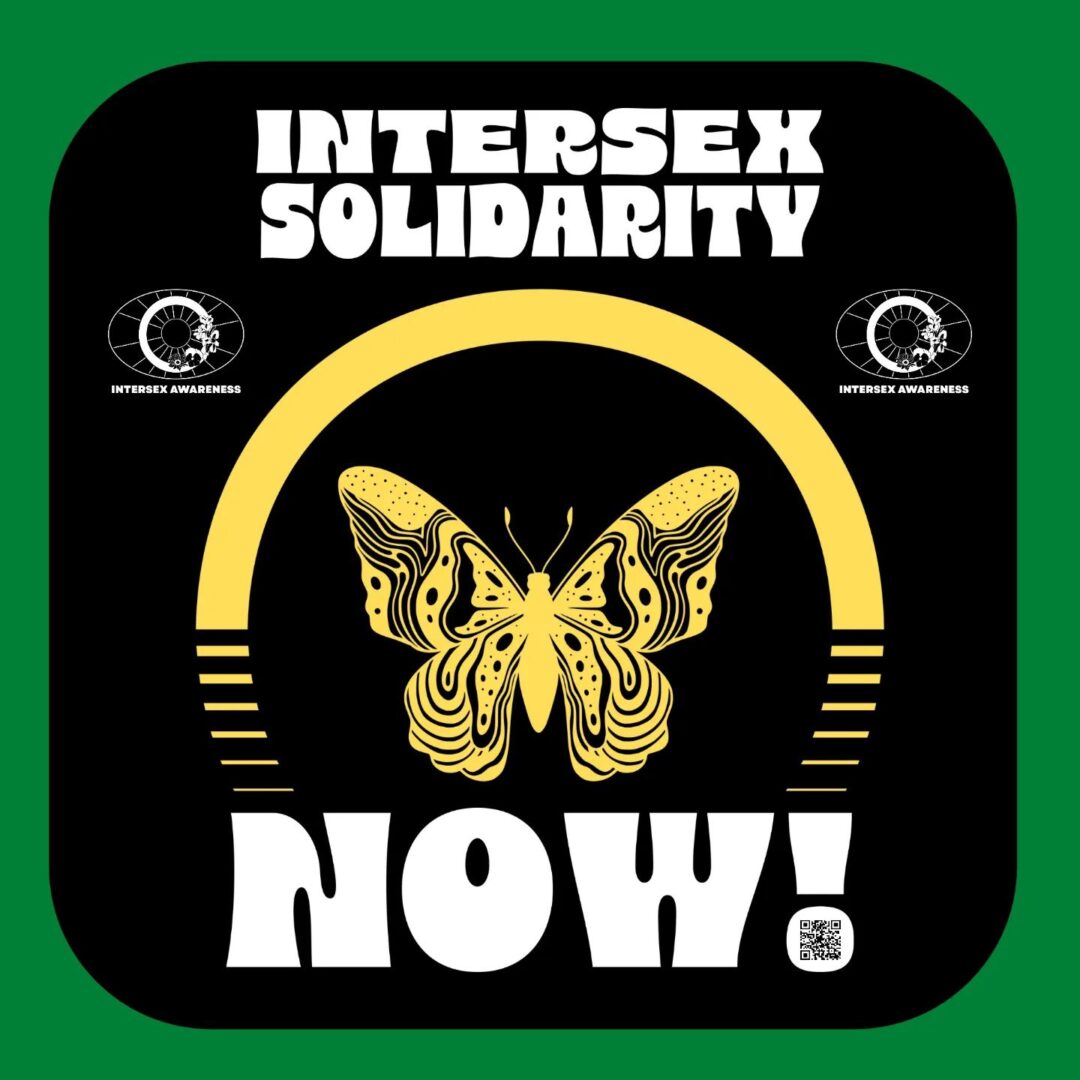
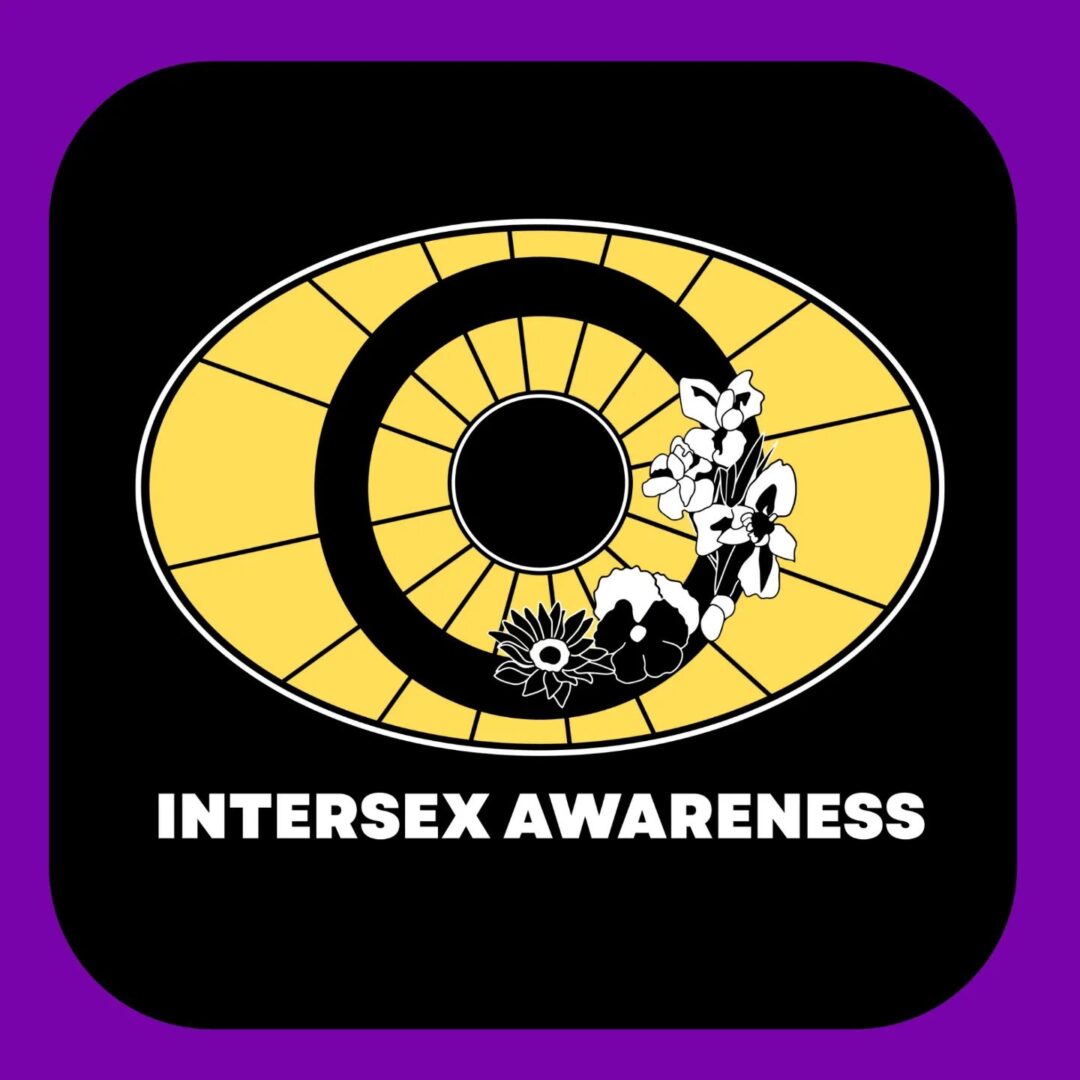
Using the restroom is something that we all do. Everyone, including intersex folks, should feel safe using the restroom in public. Bathroom bill legislation that discriminates against transgender people also discriminates against intersex people. Some intersex people have visible traits that are not seen as “typical” for one sex—for example, facial hair on a person who might otherwise be assumed feminine—and may face harassment or feel unsafe in gendered spaces.
For intersex and transgender people, whole days might be planned around finding a gender neutral or single stall restroom. This is a struggle that no one should have to deal with. Advocating for more gender neutral and single-stall restrooms benefits everyone, families too! Here’s an example of one way to start this conversation with a workplace or business manager:
“I have a suggestion for how to make your [workplace/business] safer and more inclusive for everyone, including myself. I know that we have family and wheelchair accessible restroom, but there are also people who don’t feel comfortable using a restroom that is gender-specific. In the future, maybe it would be possible to plan to have more single stall, gender neutral restrooms. In the meantime, one smaller, immediate solution might be changing the words and signage on the bathrooms to gender neutral language, such as ‘toilets’ versus ‘toilets and urinals’, and removing any images or words that imply it’s a restroom only for ‘ladies’ or ‘men’ This could help intersex, queer, and transgender people feel safer.”
Want some help? Here’s a gender neutral bathroom sign you can print out right now and place at the entrance of current bathrooms, and here’s some more information and resources.
 interACT offers many brochures written by intersex people. The free PDFs can be printed at home, or you can order glossy color copies at cost. Contact [email protected].
interACT offers many brochures written by intersex people. The free PDFs can be printed at home, or you can order glossy color copies at cost. Contact [email protected].
Progress happens one conversation at a time. Ask one friend they know, and what they would do if their child was born with intersex traits.
New parents are rarely prepared for the possibility of an intersex child, but knowing in advance leads to less stigma and more time to find support resources. Parents need to know that it’s okay to ask questions if a doctor proposes genital surgery, most importantly, “What are the risks?” and “What happens if I do nothing?”
Some great resources to start with are this article on how gender reveal party culture harms intersex people, and this guide for new parents of an intersex baby. We also highly recommend Raising Rosie, a memoir written by parents, one of whom is a nurse, of an intersex child who refused clitoral and vaginal surgery that surgeons pushed as a “necessity.”
For some intersex people, especially those who have noticeable differences in their secondary sex traits—like body hair, fat distribution, voice, etc.—using a single gender public restroom or attending a medical appointment alone can be intimidating. Medical settings can make your friend feel unsafe or uncomfortable because of past experiences or judgment from strangers. Being a buddy to an intersex friend could make them feel safer simply by knowing that you are there for moral support if they need it.
Many restaurants and small businesses donate their tips to support different causes. Some businesses might also allow you to round your purchase up to the nearest dollar amount and donate the change to support an organization. This is a great way to put that loose change to good use. If you have connections at a local business, ask if they will choose interACT: Advocates for Intersex Youth or the Intersex Justice Project as their beneficiary organization of the month.

Not all LGBT centers have intersex resources. LGBT centers could be places to build partnerships and deepen connections between intersex and LGBT communities. Many college campuses have LGBTQ centers, and intersex people often turn to these centers because there are rarely intersex-specific regional clubs or resources. Historically, many intersex youth have also found a home in trans groups, again because of a lack of intersex-specific knowledge and spaces.
Here is a sample email to send to your nearest LGBT center’s web/communications staff:
Hi there,
I was looking at your website, and didn’t see any/enough resources about intersex. The “I” in LGBTQIA is often overlooked, although many intersex people look to LGBT centers because of a lack of intersex-specific resources elsewhere. I want our LGBT center to be a place where people after the “T” feel seen and welcomed.
A great place to start could be adding some intersex links to your website resource section, such as interACT’s brochures and 4intersex ally education toolkit, plus sharing articles like this one about intersex people in queer communities.
Glad to talk further, and thanks for all you do!
interACT’s Intersex Awareness Day social media toolkit features intersex youth speaking for bodily autonomy in healthcare, and medical providers doing the same. The toolkit includes graphics and copy/paste posts for all social platforms! Remember to use hashtag #IAD2023.
There are also plenty of fantastic intersex writers releasing articles and content. You’ll find lots of links to articles in the other tips in this guide. Please share!
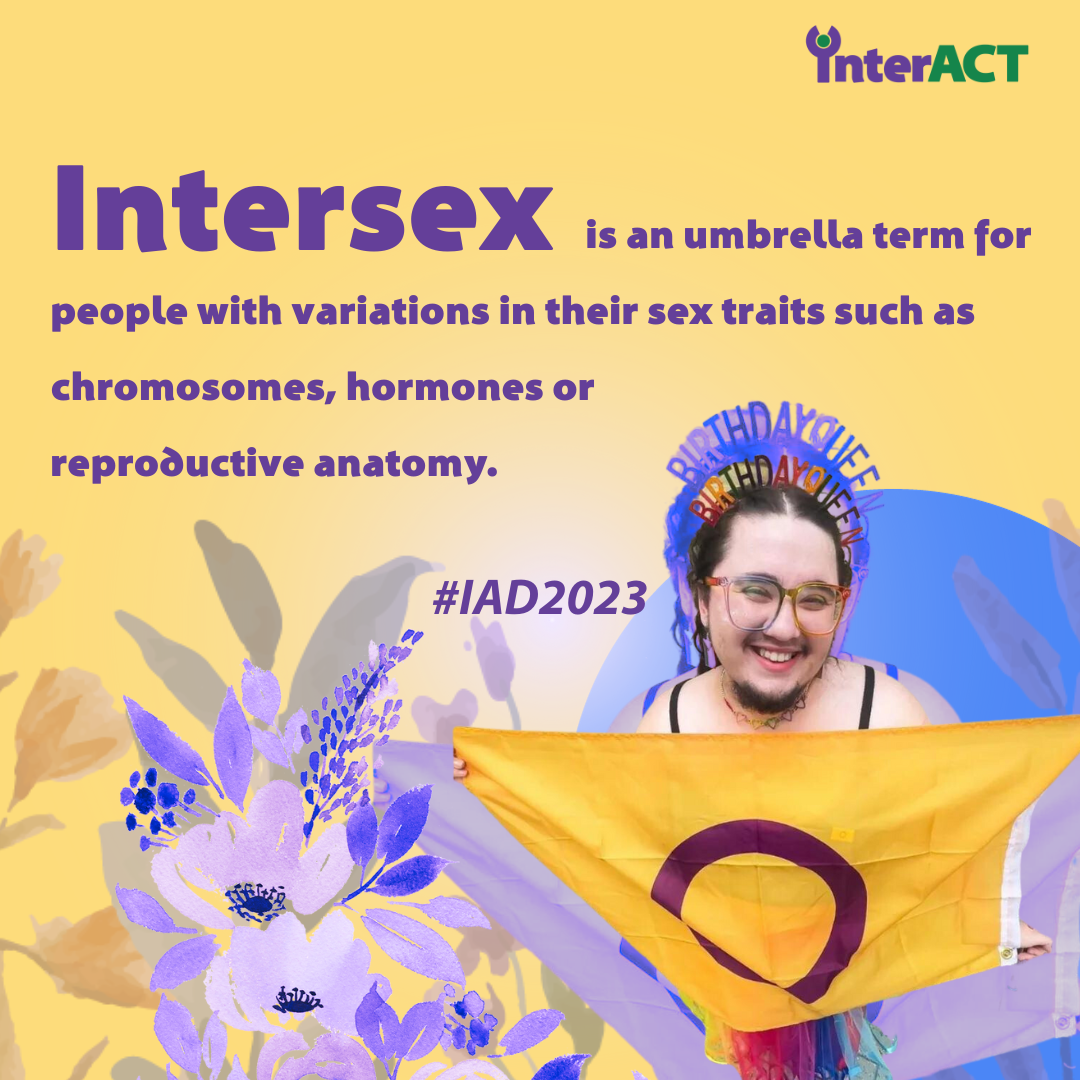
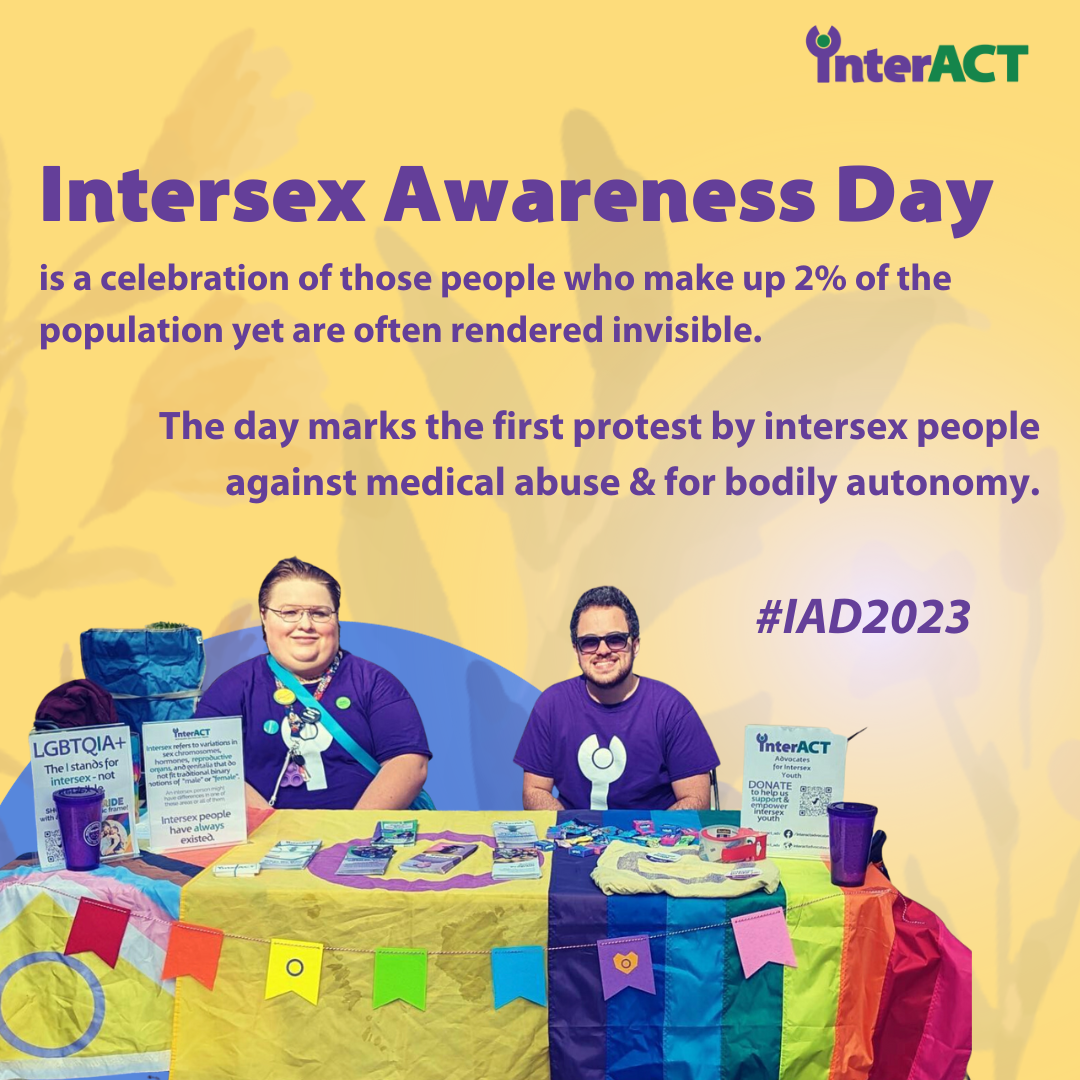
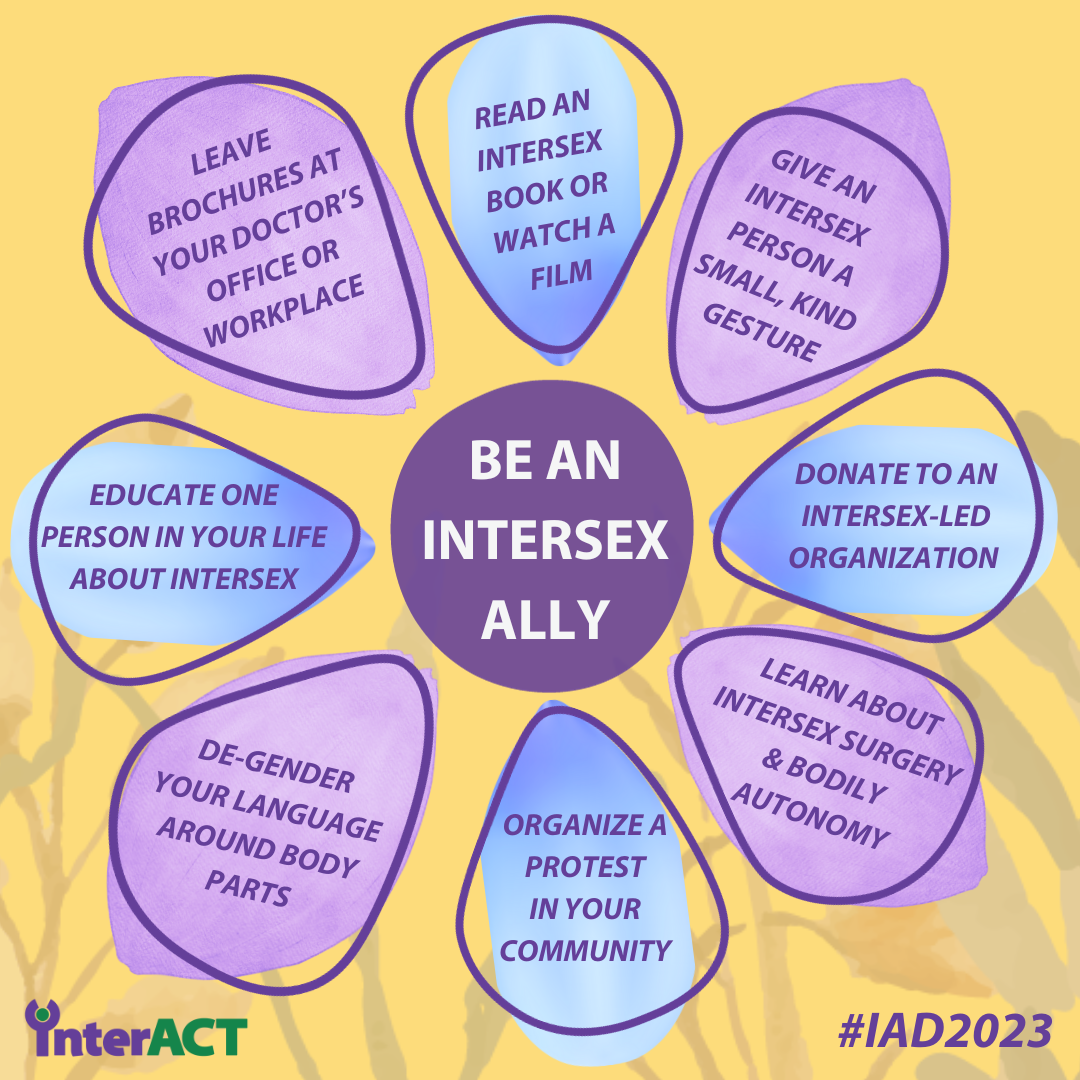

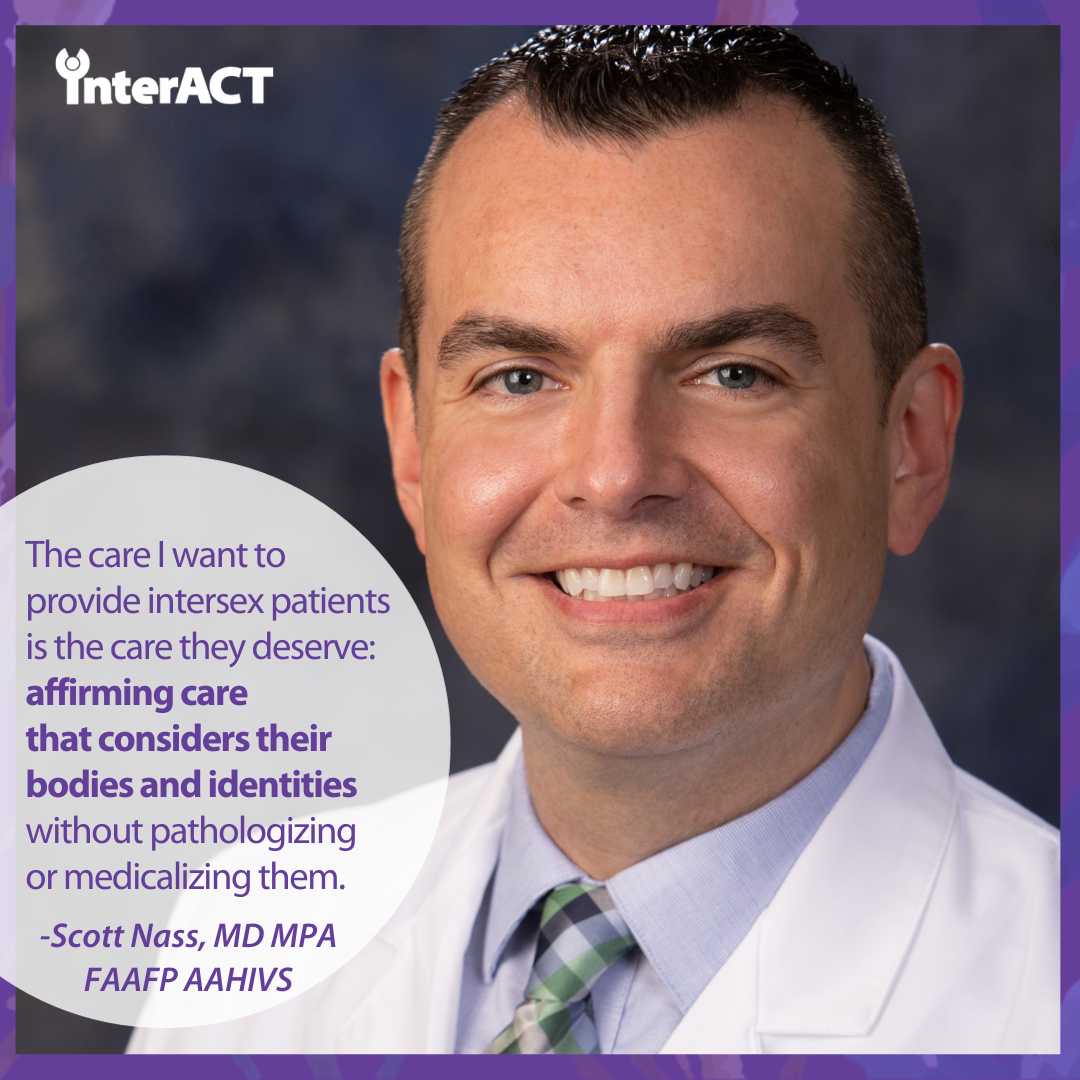
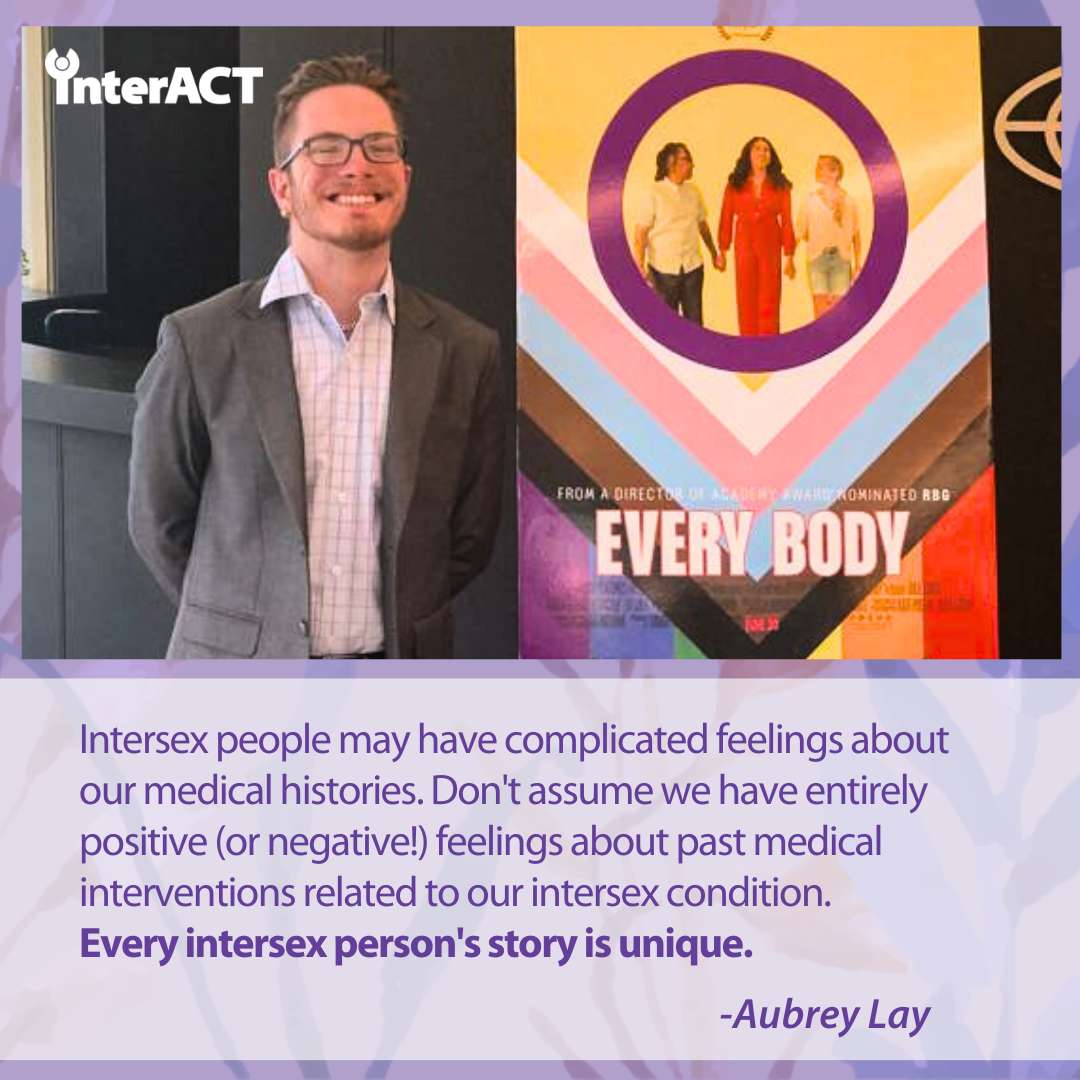
 Not one U.S. hospital has issued clear policy for delaying intersex surgeries for individual consent. That means you should call your local hospital! See interACT’s PDF resource on how to find information on your local hospital.
Not one U.S. hospital has issued clear policy for delaying intersex surgeries for individual consent. That means you should call your local hospital! See interACT’s PDF resource on how to find information on your local hospital.
A good place to start is by Google searching for your hospital + intersex (or “disorder of sex development” or “dsd,” the term many medical institutions use). Look at the resulting links. If your hospital has a page on the topic, does it emphasize waiting for a child to make their own choice, or does it encourage parents or “multidisciplinary teams” to make irreversible decisions instead?
Call your hospital to let them know how you feel, and what you hope they will do. You can reference interACT’s free resource on how hospitals can implement specific policies, written by intersex people and medical allies.
If you have children in your life, feel free to remind them that as a person in their community, you have a choice about where to bring your kids for care.
Contacting your state legislator is a great way to let them know that intersex issues are important to you. Even if your state does not currently have a bill, calls from people who live in their districts will put issues on the lawmaker’s radar.
It may help to find out if there are any local LGBT legal organizations or ACLU chapters in your area, and reach out to them first. These organizations can help create a plan to reach legislators and other stakeholders in your community who can join your coalition.
Access our Legislative Toolkit here.
 What better way to learn about intersex issues and experiences than from intersex people directly? Intersex people are here, and many of us are willing and excited to raise awareness about the barriers we face and what allies can do to help. Run a web search for intersex activists in your area, and reach out to see if they speak at schools or organizations.
What better way to learn about intersex issues and experiences than from intersex people directly? Intersex people are here, and many of us are willing and excited to raise awareness about the barriers we face and what allies can do to help. Run a web search for intersex activists in your area, and reach out to see if they speak at schools or organizations.
If you need help finding a local contact, reach out to
- interACT at [email protected]
- or Intersex Justice Project at [email protected].
While paying intersex people to speak about intersex issues is always ideal, our community is small. In order to do basic education work on a large scale, we need allies’ help. The 4intersex education website includes a free Intersex 101 Powerpoint presentation—with speaker notes—that anyone can give in about one hour!
 Intersex people are beginning to tell their own stories through film. See if there are any in your area! Filmmakers are usually very receptive to messages regarding screenings. A few intersex short film examples are:
Intersex people are beginning to tell their own stories through film. See if there are any in your area! Filmmakers are usually very receptive to messages regarding screenings. A few intersex short film examples are:
- Every Body (highlighting Sean Saifa Wall, River Gallo and Alicia Roth Weigel)
- A Normal Girl by Pidgeon Pagonis
- She’s Not a Boy by Tatenda Ngwaru
- Ponyboi by River Gallo
- The Intersex Diaries by Anick Soni
- Intersexion by Mani Mitchell and Grant Lahood (free on YouTube)

